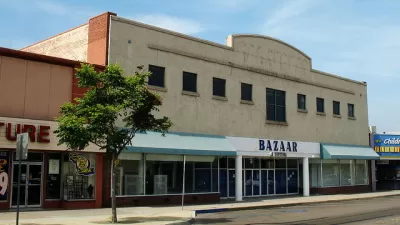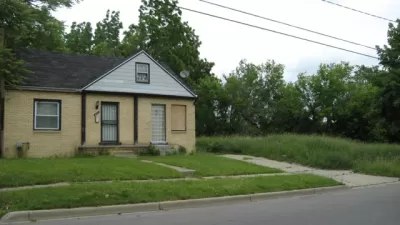Planners get involved with foreclosure by assisting residents threatened with foreclosure or addressing community impacts such as blight, vacancy, and property disinvestment. A look at vacant property fees as a tool for dealing with foreclosure.
"Foreclosure" has become more common in planning conversations since the Great Recession. Two ways that planners tend to get involved is with assisting residents facing the threat of foreclosure, and addressing various community impacts, such as blight, vacancy, and property disinvestment.
Tools for addressing the community impacts of foreclosure include housing counseling services, digital property mapping (like Detroit's), and vacant property registration fees.
Nationwide, there are over 1,500 communities enforcing vacant property registration fee ordinances, but the efficacy of these ordinances is mixed. Many smaller municipalities struggle to allocate adequate staff time to maintain property databases, resulting in spotty fee collection. On the other hand, communities that have been diligent with collecting fees find that the most negligent property owners skirt fees and penalties.
The Maine Association of Planners looks at the success of vacant property fees in Maine municipalities.
FULL STORY: Foreclosure Trends in Maine, Plus a New Tool for Blight

Planetizen Federal Action Tracker
A weekly monitor of how Trump’s orders and actions are impacting planners and planning in America.

Restaurant Patios Were a Pandemic Win — Why Were They so Hard to Keep?
Social distancing requirements and changes in travel patterns prompted cities to pilot new uses for street and sidewalk space. Then it got complicated.

Map: Where Senate Republicans Want to Sell Your Public Lands
For public land advocates, the Senate Republicans’ proposal to sell millions of acres of public land in the West is “the biggest fight of their careers.”

Maui's Vacation Rental Debate Turns Ugly
Verbal attacks, misinformation campaigns and fistfights plague a high-stakes debate to convert thousands of vacation rentals into long-term housing.

San Francisco Suspends Traffic Calming Amidst Record Deaths
Citing “a challenging fiscal landscape,” the city will cease the program on the heels of 42 traffic deaths, including 24 pedestrians.

California Homeless Arrests, Citations Spike After Ruling
An investigation reveals that anti-homeless actions increased up to 500% after Grants Pass v. Johnson — even in cities claiming no policy change.
Urban Design for Planners 1: Software Tools
This six-course series explores essential urban design concepts using open source software and equips planners with the tools they need to participate fully in the urban design process.
Planning for Universal Design
Learn the tools for implementing Universal Design in planning regulations.
Heyer Gruel & Associates PA
JM Goldson LLC
Custer County Colorado
City of Camden Redevelopment Agency
City of Astoria
Transportation Research & Education Center (TREC) at Portland State University
Camden Redevelopment Agency
City of Claremont
Municipality of Princeton (NJ)




























